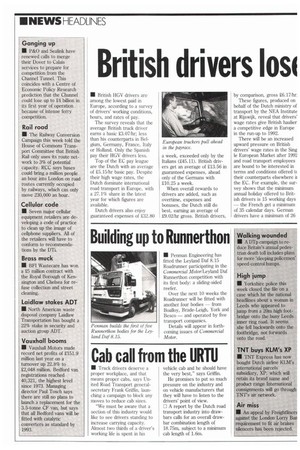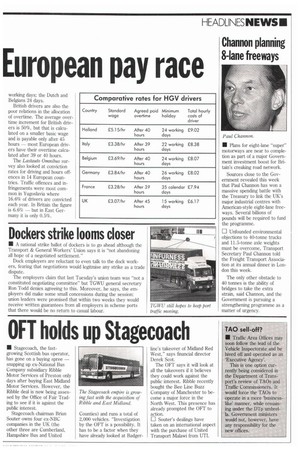British drivers loso European pay race
Page 6

Page 7

If you've noticed an error in this article please click here to report it so we can fix it.
• British HGV drivers are among the lowest paid in Europe, according to a survey of drivers' working conditions, hours, and rates of pay.
The survey reveals that the average British truck driver earns a basic £3.07/hr; less than his counterparts in Belgium, Germany, France, Italy or Holland. Only the Spanish pay their HGV drivers less.
Top of the EC pay league are the Dutch with an average of £5.15/hr basic pay. Despite their high wage rates, the Dutch dominate international road transport in Europe, with a 27.1% share in the latest year for which figures are available.
Dutch drivers also enjoy guaranteed expenses of 232.80 a week, exceeded only by the Italians (2.45.11). British drivers get an average of £13.56 in guaranteed expenses, ahead only of the Germans with .210.25 a week.
When overall rewards to drivers are added, such as overtime, expenses and bonuses, the Dutch still do best, earning an average of 29.02/hr gross. British drivers, by comparison, gross 26.17/hr.
These figures, produced on behalf of the Dutch ministry of transport by the NEA Institute at Rijswijk, reveal that drivers' wage rates give British haulier a competitive edge in Europe in the run-up to 1992.
There will be an increased upward pressure on British drivers' wage rates in the Sing le European Market after 1992 and road transport employees are bound to be interested in terms and conditions offered tt their counterparts elsewhere ii the EC. For example, the survey shows that the minimum annual holiday offered to British drivers is 15 working days — the French get a minimum of 35 calendar days. German drivers have a minimum of 26 working days; the Dutch and Belgians 24 days.
British drivers are also the poor relations in the allocation of overtime. The average overtime increment for British drivers is 50%, but that is calculated on a smaller basic wage and is payable only after 45 hours — most European drivers have their overtime calculated after 39 or 40 hours.
The Lastauto Omnibus survey also looked at conviction rates for driving and hours offences in 14 European countries. Traffic offences and infringements were most common in Yugoslavia where 16.6% of drivers are convicted each year. In Britain the figure is 6.6% — but in East Germany it is only 0.5%.




































































































































































































